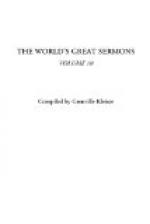The psalmist lived in a period when belief in the reality of many gods was still strong, and when a man who would follow the one true God had to prefer to do so against the attractions of other deities and against the convictions of a great number of his fellow countrymen that these deities were living and powerful. That stage of religion is so distant from ourselves that we may imagine the psalmist’s example to be of no practical value for our faith, yet in such an imagination we should be very much mistaken indeed, for, to begin with, consider how much you and I to-day owe to those believers who so many centuries ago rejected all the gods that offered themselves to the hearts of men except the true God, and who chose to cleave to Him alone with all that passionate loyalty which breathes through these verses. But for them you and I could not be standing where we are in religion to-day. As the eleventh of Hebrews reminds us, we are the spiritual heir of such believers. It is to their struggles and their faith and their victories that we greatly owe it that we have been born into an atmosphere in which no religious belief is possible to us save in one God who is Spirit and Righteousness and all Truth.
That, then, was the great choice that the psalmist’s faith was turning to—a choice that was no mere assent to a creed that had been fought for and established by previous generations of believers. It was the man’s own proving of things unseen and his own preference of those against the crowd and a system of things seen, palpable, and very powerful in their attraction for the senses of humanity. But we are not to suppose that the rival deities, from which this man turned to the unseen God, were to his mind or to the mind of his day the heap of dead and ugly idols which we know them to be. They were not dead things that he could kick away with his feet that these believers had to reject when they sought the living God, but things which he and his contemporaries felt to be alive and powerful; powerful alike in their seduction and in their vengeance. They were believed to be identical, as you know, with the forces of nature; they were supposed to be indispensable to the welfare of the individual and of society, and they were fanatically supported at the time by the mass of this man’s own countrymen; so that to break from them in those days meant to abandon ancient opinions and habits, to resist many pleasant and natural temptations and to incur the hostility, as was believed, of the powers of nature, to break with customs and with rites that had fortified and consoled the individual heart for generations and been the support and sanction of society and of the state as well. Yet this man did it. From all that living crowd and system, from all those visible temptations and terrors he turned to the unseen, fully conscious of his danger, for he opens his Psalm with a great cry, “Preserve me, preserve me, O God!” but yet deliberately,




